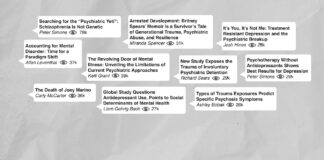Tag: psychotherapy
Psychotherapy, Spirituality, and Democratic Socialism: A Conversation with Frank Gruba-McCallister
Frank Gruba-McCallister argues that healing must confront capitalism, reclaim spirituality, and advance justice.
Depression: Does Psychotherapy Make New Nerve Cells Grow?
From SciLogs: "According to a study at the University of Halle-Wittenberg, the effect of psychotherapy has now been “medically and scientifically” proven.
A research group...
Therapy in the Age of Self Management and Public Abandonment: A...
Talia Weiner discusses how conservative politics and market logic reshape mental health care.
The Poetics and Politics of Our Mental Health Metaphors: An Interview...
Ayurdhi Dhar interviews influential cultural psychiatrist Laurence Kirmayer on how metaphors, histories, and social structures contour our experiences of suffering and healing.
Psychology’s Small Stories and the Call of the Other: An Interview...
Ayurdhi Dhar interviews David Goodman about his vision for a psychology grounded in care for the other, the risks of psychotherapeutic standardization, and why humility—and even embarrassment—may be vital to human flourishing.
Psychotherapy and Social Change: Mick Cooper on Counseling, Pluralism, and Progressive...
Javier Rizo interviews Mick Cooper on the intersection of psychotherapy and social transformation, the pluralistic approach to counseling, and the role of psychology in building a more just society.
“All Real Living Is Meeting”: Brent Robbins on Love, Death, and...
Psychologist and existential thinker Brent Robbins reflects on a lifetime of work, the limits of psychiatric diagnosis, and what facing mortality has taught him about joy and human connection.
Mad in America’s 10 Most Popular Articles in 2024
A roundup of Mad in America's most read blogs and personal stories of 2024 as chosen by our readers.
Stop Using Antidepressants Except for “the Most Severe Depression,” Experts Say
Experts advocate limiting antidepressant use to only the most severe cases of depression, emphasizing the need for social and psychological interventions.
Australia’s Billion-Dollar Question: Why Is Mental Health Not Improving With Better...
Amid growing mental health crisis, research raises questions about the mass rollout of brief psychotherapies in Australia.
The Social Unconscious and Character Formation in Neoliberal Culture: An Interview...
MIA’s Javier Rizo interviews Lynne Layton about social psychoanalysis and how normative unconscious processes can help illuminate how oppressive systems get internalized and reproduced.
Psychotherapy Has an Enduring Effect on Depression—in Contrast to Depression Pills
A meta-analysis published last month showed that psychotherapy has an enduring effect on depression—in contrast to depression pills.
Drowning in Doubts: Why I Think About Leaving Psychiatry
Going into psychiatry as a naïve 25-year-old, I had no idea what I would discover. If I knew then what I know now, I wouldn’t have chosen this field.
Mental Health Survival Kit, Chapter 3: Psychotherapy: The Human Approach to...
Through the process of healing—whether assisted by psychotherapy or not—we learn something important that can be useful if we get in trouble again.
How Therapists Can Help With Psychiatric Drug Withdrawal: An Interview With...
MIA's Richard Sears interviews psychotherapist Anne Guy about working with clients withdrawing from psychiatric drugs.
Giving Up on Mental Health Care
After 34 years, I've concluded that some psychologists/psychiatrists may genuinely want to help people, but they certainly don't have a good toolbox to do it with and, quite likely, never will.
Insane Medicine, Chapter 7: Industrialised Psychotherapy Markets Western Folk Psychology (Part...
Sami Timimi explores the common factors that influence therapy’s success, the evidence base for psychotherapy, and the over-promotion of CBT.
Leading Psychology in Existential Times: An Interview with Kirk Schneider
MIA’s Justin Karter interviews humanistic-existential psychologist Kirk Schneider about how psychology can play a role in confronting the political, social, and climate crises facing humankind.
“Be Kind to Yourself… For Us!”
Ann: "I’ve fallen in love! With my group! And they’re in love with me!" Hugh: "The group and you have an important relationship that you’re creating together week after week. This includes breaking down the authoritarian boundaries that keep people in their “places” so that they can’t grow."
Blurring the Line Between “Us” and “Them”
Most, if not all, mental health providers, will face dealing with major ethical issues. In their quest to reach as many consumers as possible, to streamline the process, to be as efficient as possible during this pandemic, was the therapeutic process truly helpful? Were key components of what “should” happen between both parties still prioritized?
Can Psychiatry Respond to Mad Activism?
Psychiatrist Mohammed Abouelleil Rashed explores a way forward for psychiatry in responding to the Mad activism of service users.
What is the Evidence for Empirically Supported Treatments in Psychology?
New meta-scientific review questions the evidence for the gold standard psychotherapies and empirically supported treatments.
Why is the Field of Psychotherapy Still Fractured into Different Approaches?
Psychotherapy is dominated by contradicting schools of thought, exhibits a gap between research and practice, and repackages old ideas rather than finding clinical consensus.
Psychotherapy Less Effective for People in Poverty and Those on Antidepressants
A new study finds poorer depression and anxiety outcomes in psychotherapy for people in economically deprived neighborhoods and those on antidepressants.
Therapy Gets More Effective Over Time While Antidepressants Decrease in Effectiveness
New review of long-term depression data finds psychotherapy more effective over time whereas antidepressants decrease in effectiveness.

































